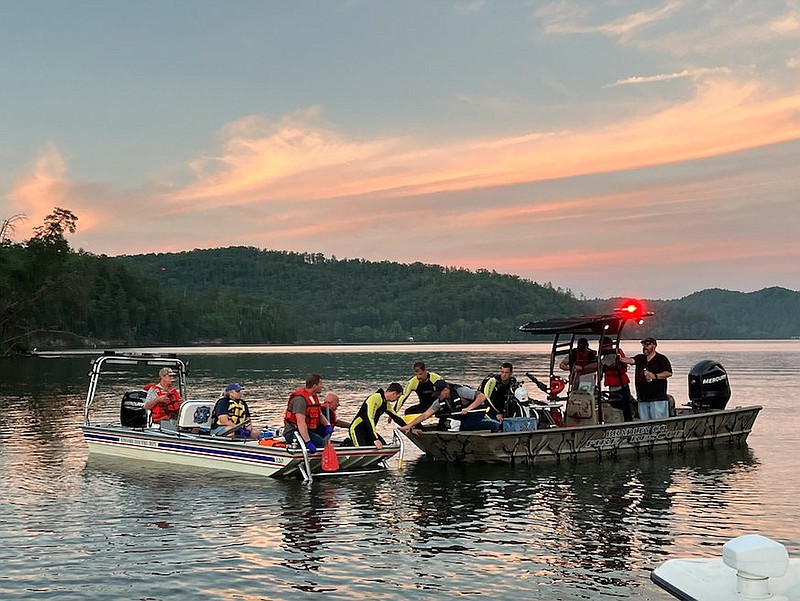The number of boating-related fatalities in Tennessee so far this year is closing in on 2022's mark after the death of a Cannon County man over the weekend.
The total so far this year stands at 24, on pace to match or exceed last year's total of 29 with two months left in the year, according to data from the Tennessee Wildlife Resources Agency. Boating-related deaths have averaged 22 a year since the state started keeping records in 1965.
On Saturday in DeKalb County, a 69-year-old Cannon County man drowned on the Caney Fork River and was later found by Tennessee Wildlife Resources Agency officers who located an overturned kayak just after 11 a.m. CDT, according to a state news release. The man, identified as Robert Lester, and his wife left the Buffalo Valley Boat Ramp by kayak, and the man's kayak struck a tree and capsized. The boat ramp is about 1,000 feet downstream of Center Hill Dam, about 50 miles east of Nashville.
Lester's wife was uninjured, according to TWRA spokesperson Mime Barnes.
(READ MORE: 'Operation Dry Water' launched to promote boater safety over July 4 holiday weekend)
Rescuers searched the area, and the man's body was found in 8 feet of water by Tennessee Highway Patrol helicopter, less than 100 yards from where the kayak overturned, authorities said.
Robert Lester was not wearing a life jacket. His body was recovered and taken to the DeKalb County Hospital, wildlife officials said. An investigation is ongoing.
There's no way to predict whether boating deaths will remain at 24 for the rest of 2023, according to agency spokesperson Mime Barnes.
"We're always hopeful there will be decline in boating fatalities," Barnes said in an email. "As an agency, our goal is zero."
In 2020, boating fatality numbers soared to 31, tying a 40-year high set in 1996, then rebounded in 2022 back to a near-average 21 deaths, records show. Then in 2022, the number of fatalities swelled to 29.
The most fatalities ever happened in 1973, when 47 people died on Tennessee waterways, records show.
All boaters should obtain Tennessee's boating handbook, which provides important information on safety equipment, safe operating practices and state boating laws, Barnes said. The operator of any boat should make safety a first priority.
"One thing we ask of all boaters is simply wear a life jacket -- anyone 12 and under must wear one," Barnes said. "There are many brands available that are comfortable. It must be Coast Guard approved."
Rules vary slightly, depending on the vessel. Throw cushions are not needed on personal watercraft, such as kayaks, but there should be a life jacket for every individual on any vessel, Barnes said.
Tips for boaters
— Take a boating safety course. Gain valuable knowledge and on-water experience with options for novice to experienced boaters.
— Check equipment. Schedule a free vessel safety check with local U.S. Coast Guard Auxiliary or U.S. Power Squadrons.
— Make a float plan. Always let someone on shore know the trip itinerary, including passenger information, boat type and communication equipment on board.
— Wear a life jacket. Make sure everyone wears a life jacket every time. A stowed life jacket is of no use in an emergency.
— Use an engine cut-off device. The safety device stops the boat's engine if the operator unexpectedly falls overboard.
— Watch the weather. Always check the forecast before departing on the water and frequently during the excursion.
— Know what's going on around you. Nearly a quarter of all reported boating accidents in 2022 were caused by operator inattention or improper lookout.
— Know where you're going and travel at safe speeds. Be familiar with the area and local boating speed zones.
— Never boat under the influence. A BUI is involved in one-third of all recreational boating fatalities. Always designate a sober skipper.
— Keep in touch. Have more than one communication device that works when wet -- VHF radios, emergency locator beacons, satellite phones, cellphones.
Source: Tennessee Wildlife Resources Agency
"Lastly, we're coming into colder weather. Cold weather boating entails the same safety measures as warm weather boating with the addition of proper clothing," Barnes said. "Let someone know where you're going and when to expect you home. Make sure all needed safety equipment is on your vessel, including life jackets. Have a lookout. Be aware of weather conditions."
An investigator reported this year's accidents included "a fair number of collisions," with contributing factors like weather, the number of boaters on the water and water levels, Barnes said.
(READ MORE: Head of Baylor School has boating under the influence charges dismissed)
"I'd be remiss if I didn't also add alcohol use and the changes in BUI laws," Barnes said, of state law changes that make the penalty for a BUI the same as a DUI.
As of July 1, BUI penalties aligned with DUI laws in terms of jail time, fines and loss of boat operating privileges, according to state officials. For a first offense in Tennessee, the penalty is at least 48 hours in jail and a year's revocation of driving privileges.
Under Tennessee and federal law, the legal blood alcohol limit is 0.08%.
Contact Ben Benton at bbenton@timesfreepress.com or 423-757-6569.
